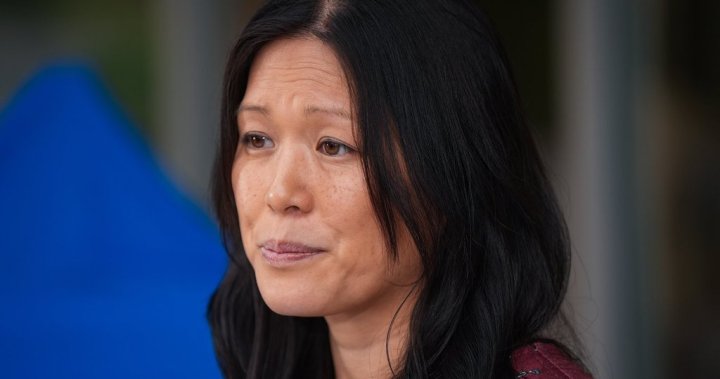The angry phone call came just after 8:00 AM on a Tuesday. Constituency assistant Rachel Wang’s voice trembled slightly as she described the caller’s explicit threats against Transportation Minister Bowinn Ma. This wasn’t standard political criticism—these were detailed death threats, the latest in an alarming pattern targeting the North Vancouver-Lonsdale MLA.
“We’ve seen a dramatic shift in both tone and frequency,” Wang told me during our interview at Ma’s constituency office. “What used to be occasional heated disagreements have become something much darker.”
Three weeks earlier, an explosion damaged the exterior of Minister Ma’s constituency office. While no one was injured, the RCMP investigation continues, with authorities unwilling to rule out political motivation behind the attack.
Minister Ma, who recently returned from maternity leave after giving birth to her first child last year, has faced an intensifying barrage of threats. Sources close to the minister confirm that security measures around her have been substantially increased, though specific details remain confidential for safety reasons.
The threats against Ma aren’t isolated incidents. Across British Columbia, elected officials report escalating hostility. Vancouver Mayor Ken Sim revealed last February that he was the target of death threats with racist overtones. Premier David Eby has spoken about increased security protocols for cabinet members following several concerning incidents at public events.
“When I first ran for office in 2017, nobody warned me I might need personal security,” Ma told reporters last week. “The political climate has transformed dramatically in just seven years.”
BC Public Safety Minister Mike Farnworth expressed grave concern about the situation during a press conference Thursday. “What we’re witnessing isn’t just unacceptable—it represents a fundamental threat to our democratic institutions,” Farnworth said. “Those who resort to violence or threats undermine the very foundations of our governance system.”
Political science professor Heather MacIntosh from Simon Fraser University points to multiple factors driving this troubling trend. “We’re seeing the impacts of heightened polarization, the amplifying effects of social media, and increasing public frustration with government responses to housing, affordability, and other pressing issues,” she explained during our phone conversation.
Data from the Parliamentary Protective Service shows a 158% increase in threats against elected officials across Canada over the past four years. British Columbia has experienced some of the steepest increases, particularly among female and racialized politicians.
For Ma, the concerns extend beyond personal safety. “The minister is deeply worried about her staff and constituents who visit the office,” a spokesperson from her ministry told me. “These threats create a chilling effect on democratic participation.”
Community reaction in North Vancouver has been swift. Last weekend, over 200 residents gathered outside Ma’s office in a show of solidarity. Organizer Jordan Chen described the motivation: “We can disagree on policy without resorting to threats or violence. Minister Ma is our neighbour first, a politician second.”
The explosion at Ma’s office caused approximately $18,000 in damage, according to insurance assessors. Security cameras captured footage of an individual approaching the building at 2:17 AM, though RCMP haven’t released details about potential suspects.
“We’re investigating all possible motives,” North Vancouver RCMP Sergeant Lynn Patterson confirmed. “Given the minister’s position, we can’t dismiss the possibility that this was politically motivated.”
Ma’s colleagues across party lines have condemned the threats. BC Liberal Opposition Leader Kevin Falcon issued a statement calling the situation “deeply disturbing” and emphasizing that “political violence has no place in our province.”
The threats appear connected to controversial transportation policies Ma has championed, including cycling infrastructure expansions and changes to the provincial highway system. A recent proposal to implement congestion pricing on certain routes generated particularly heated opposition.
Teresa Wong, who owns a small business near Ma’s constituency office, expressed concern about the broader implications. “If good people are driven away from public service because of threats, who will be left to represent us?” she asked, rearranging items in her shop window. “I don’t always agree with Minister Ma’s policies, but threatening her is completely unacceptable.”
Political harassment expert Dr. James Montford from the University of British Columbia noted a troubling pattern in who receives the most severe threats. “Female politicians, especially those from visible minority backgrounds, experience disproportionately higher rates of harassment and violent threats,” Montford explained. “The intersectionality of gender and race creates a perfect storm for targeted hatred.”
Minister Ma, an engineer by training and the first Chinese-Canadian woman to serve in BC’s cabinet, has been open about the racial and gendered dimensions of threats she’s received. Last year, she shared redacted examples of hateful messages during a legislative committee meeting on democratic institutions.
Premier Eby has directed a comprehensive review of security protocols for all elected officials in British Columbia. The province is also exploring potential legislative changes to better protect politicians and their staff from targeted harassment.
For now, Minister Ma continues her work while navigating enhanced security measures. Her staff has implemented new protocols for constituency office visitors, and community volunteers have organized a “walk together” program to ensure staff members reach their vehicles safely after evening events.
As our democratic institutions face these evolving threats, the resilience of those who serve in public office is being tested like never before. The question remains whether we as citizens will collectively reject political violence and recommit to respectful democratic engagement—before more than just office windows are shattered.






